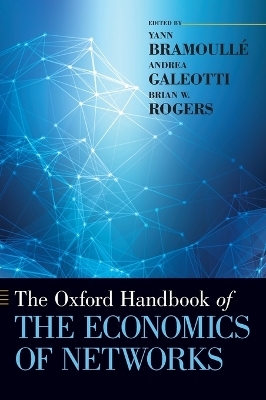
The Oxford Handbook of the Economics of Networks
Oxford University Press Inc (Verlag)
978-0-19-994827-7 (ISBN)
The Oxford Handbook of the Economics of Networks represents the frontier of research into how and why networks form, how they influence behavior, how they help govern outcomes in an interactive world, and how they shape collective decision making, opinion formation, and diffusion dynamics. From a methodological perspective, the contributors to this volume devote attention to theory, field experiments, laboratory experiments, and econometrics. Theoretical work in network formation, games played on networks, repeated games, and the interaction between linking and behavior is synthesized.
A number of chapters are devoted to studying social process mediated by networks. Topics here include opinion formation, diffusion of information and disease, and learning. There are also chapters devoted to financial contagion and systemic risk, motivated in part by the recent financial crises. Another section discusses communities, with applications including social trust, favor exchange, and social collateral; the importance of communities for migration patterns; and the role that networks and communities play in the labor market.
A prominent role of networks, from an economic perspective, is that they mediate trade. Several chapters cover bilateral trade in networks, strategic intermediation, and the role of networks in international trade. Contributions discuss as well the role of networks for organizations. On the one hand, one chapter discusses the role of networks for the performance of organizations, while two other chapters discuss managing networks of consumers and pricing in the presence of network-based spillovers.
Finally, the authors discuss the internet as a network with attention to the issue of net neutrality.
Yann Bramoullé is a CNRS Research Fellow at Aix-Marseille University. He graduated from École Polytechnique in France in 1995 and obtained his PhD from the University of Maryland, College Park in 2002. He was an economics professor at Laval University in Québec until 2012 and was nominated for the prize of the best French young economist in 2013. He currently works on the interaction between markets and networks, a project for which he obtained an ERC consolidator grant in 2014, on strategic interaction and networks, altruism in networks, and the econometrics of social networks. Andrea Galeotti is Professor of Economics at the European University Institute and University of Essex. He is a leading international scholar in the study of social and economic networks. He has published articles in, among others, The American Economic Review, Review of Economic Studies, and the American Journal of Political Science. He serves as co-Editor of The Economic Journal and is a Board Member of The Review of Economic Studies. Brian Rogers is an Associate Professor in Economics at Washington University in St. Louis, where he also directs the Missouri Social Science Experimental Laboratory (MISSEL). Prof. Rogers received his Ph.D. from Caltech in 2006 and was on the faculty in Managerial Economics and Decision Sciences (MEDS) at the Kellogg School of Management at Northwestern University from 2006-2013. His research is broadly in microeconomic theory and game theory, with a particular emphasis on the role of networks and social interactions in strategic models. Recent work includes incorporating incentives into epidemiological diffusion models, as well as understanding the coevolution of partner choices and repeated play in social models of games.
I. INTRODUCTION
1. Introduction: Yann Bramoullé, Andrea Galeotti and Brian Rogers
II. PERSPECTIVES
2. Networks: A Paradigm Shift for Economics?: Alan Kirman
3. Networks in Economics: A Perspective on the Literature: Sanjeev Goyal
4. The Past and Future of Network Analysis in Economics: Matthew Jackson
III. NETWORK GAMES AND NETWORK FORMATION
5. Games Played on Networks: Yann Bramoullé and Rachel Kranton
6. Repeated Games and Networks: Francesco Nava
7. Stochastic Network Formation and Homophily: Paolo Pin and Brian Rogers
8. Network Formation Games: Ana Mauleon and Vincent Vannetelbosch
9. Links and Actions in Interplay: Fernando Vega-Redondo
10. Conflict and Networks: Marcin Dziubinski, Sanjeev Goyal, and Adrien Vigier
11. Key Players: Yves Zenou
IV. EMPIRICS AND EXPERIMENTS
12. Some Challenges in the Empirics of the Effects of Networks: Vincent Boucher and Bernard Fortin
13. Econometrics of Network Formation: Arun Chandrasekhar
14. Small World Networks: Duncan Watts
15. Networked Experiments: A Review of Methods and Innovations: Sinan Aral
16. Field Experiments, Social Networks, and Development: Emily Breza
17. Networks in the Laboratory: Syngjoo Choi, Edoardo Gallo, and Shachar Kariv
V. DIFFUSION, LEARNING AND CONTAGION
18. Diffusion in Networks: PJ Lamberson
19. Learning in Social Networks: Ben Golub and Evan Sadler
20. Financial Contagion in Networks: Antonio Cabrales, Douglas Gale, and Piero Gottardi
21. Networks, Shocks, and Systemic Risk: Daron Acemoglu, Asu Ozdaglar, and Alireza Tahbaz-Salehi
VI. COMMUNITIES
22. Informal Transfers in Social Networks: Markus Mobius and Tanya Rosenblat
23. Community Networks and Migration: Kaivan Munshi
24. Social Networks and the Labor Market: Lori Beaman
VII. ORGANIZATIONS AND MARKETS
25. Attention in Organizations: Wouter Dessein and Andrea Prat
26. Models of Bilateral Trade in Networks: Mihai Manea
27. Strategic Models of Intermediation Networks: Daniele Condorelli and Andrea Galeotti
28. Networks in International Trade: Thomas Chaney
29. Targeting and Pricing in Social Networks: Francis Bloch
30. Managing Social Interactions: Dina Mayzlin
31. Economics Features of the Internet and Network Neutrality: Nicholas Economides
| Erscheinungsdatum | 12.03.2016 |
|---|---|
| Reihe/Serie | Oxford Handbooks |
| Verlagsort | New York |
| Sprache | englisch |
| Maße | 251 x 183 mm |
| Gewicht | 1542 g |
| Themenwelt | Mathematik / Informatik ► Mathematik ► Angewandte Mathematik |
| Mathematik / Informatik ► Mathematik ► Finanz- / Wirtschaftsmathematik | |
| Wirtschaft ► Allgemeines / Lexika | |
| Wirtschaft ► Volkswirtschaftslehre ► Ökonometrie | |
| ISBN-10 | 0-19-994827-5 / 0199948275 |
| ISBN-13 | 978-0-19-994827-7 / 9780199948277 |
| Zustand | Neuware |
| Informationen gemäß Produktsicherheitsverordnung (GPSR) | |
| Haben Sie eine Frage zum Produkt? |
aus dem Bereich


